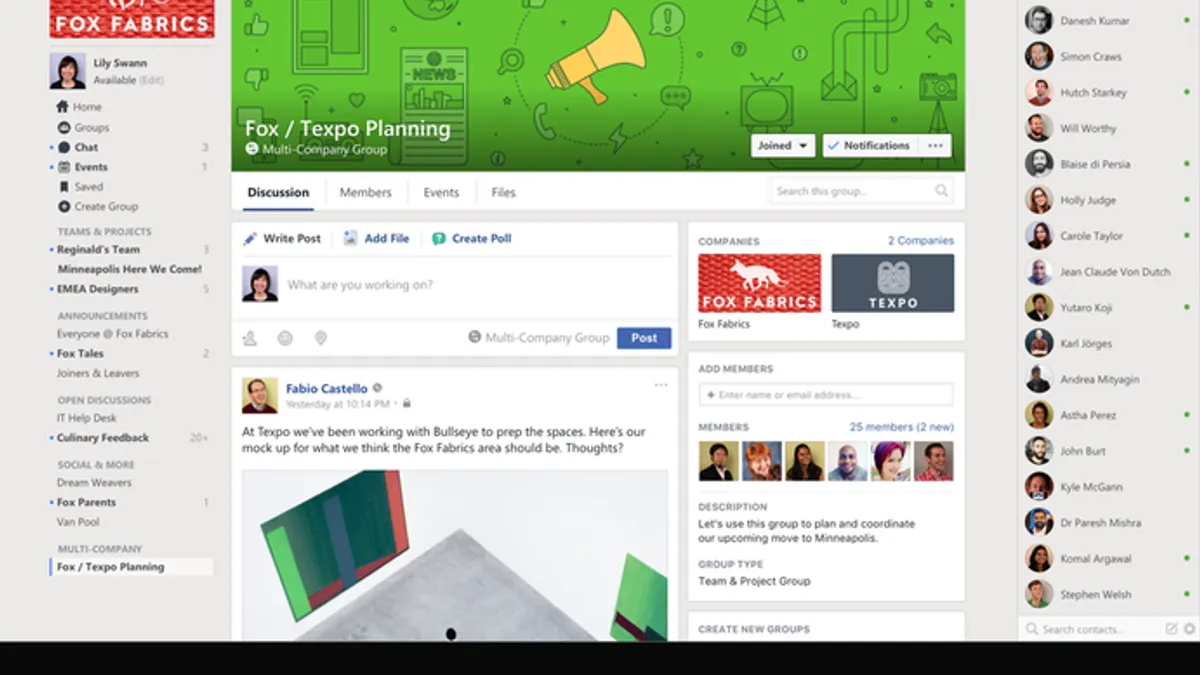After 20 months in closed beta, Facebook launched its enterprise social network Monday. But the launch of raises an obvious question: In a business world dominated by Slack and similar apps, is there any room at the table for a late entry — even one from such a well-known company?
Facebook is betting on it. The platform, Workplace by Facebook, goes beyond chat. It allows coworkers to keep in touch and share work in a variety of ways, just as the consumer version of Facebook allows for connections with family and friends.
With the product, Facebook is betting that companies want more than just a chat tool and email to create cohesion across business units, particularly in organizations with offices worldwide.
Workplace "offers familiarity, simplicity and it actually makes it tangible that people can work in a social manner." Carrie Basham Young, founder and principal of Talk Social To Me, a consulting firm that helps enterprises launch social networking tools. "It actually clicks for most people because they use Facebook in their personal lives."
Stiff competition
Workplace faces a crowded enterprise collaboration market.
Take Slack, for example. The workplace messaging startup has received a steady stream of investment and as of May touted 3 million daily active users, with 2 million connected simultaneously. In April, Slack said it had more than 800,000 paying customers, with corporate users such as NASA and Spotify.
Though the company is a runaway hit, it will likely continue to struggle with scale, which is why many startups are acquired by older vendors.
Facebook, on the other hand, has an army of engineers working to support its vast user base. During its lengthy pilot program, Workplace signed up more than 1,000 organizations around the world, according to the announcement.
Those early adopters have already created almost 100,000 groups and is most-used in India, the United States, Norway, the United Kingdom and France.
Workplace also boasts larger multinational companies such as Danone, Starbucks and Bookings.com as customers.
"Workplace can do scale," Young said. "They clearly can do scale with billions of users … they have thousands of engineers working with this product."
After all, "Facebook knows social," Young said.
But Facebook has something that neither Slack, HipChat, Yammer or Microsoft’s reported Skype enterprise messaging service can offer for now: allowing employees to work in an online community.
It’s "the idea of social collaboration versus community," Young said. Tools such as Yammer and Slack allow for social collaboration and connecting the enterprise. But Young said Workplace allows for an innovative workflow, which can strengthen enterprise collaboration.
"Cross-department collaboration helps you build awareness on who works on what, where," Young said. Workplace is a conduit for building relationships in an enterprise, allowing employees to fully realize the capabilities and knowledge-base of their coworkers, rather than just understanding what the enterprise says that they know.
Competing on price
Workplace has many of the features users are familiar with, such as the News Feed or chat, as well as Reactions, Facebook Live and trending posts. But the platform also features analytics and monitoring tools for IT teams, single sign-on and identity providers, which allow companies to easily integrate Workplace with their current systems.
Facebook also launched Multi-Company Groups, which gives companies a space to securely share information.
With the rollout, Facebook also released its pricing model. It will cost companies $3 per user for up to 1,000 monthly active users; $2 per user for 1,001 to 10,000 monthly active users; and $1 per user for organizations with more than 10,000 monthly active users. The platform is also free for nonprofits and educational institutions.
By comparison, Slack's cheapest paid plan is $6.67 per user per month.
Young said Facebook needs to be able to compete on price to really take off, especially with a fourth-quarter debut. The last quarter traditionally is software budgeting and buying season for enterprises in the coming year.
"It needs to be affordable so people aren’t afraid to try it out and see if it works," Young said.
Pushing for development
No matter the level of familiarity, Workplace still has a long way to go before it becomes a dominant presence in the enterprise.
Though it already has a robust API, it does not have the level of business system integration that some IT teams are going to want, though that will come in time as more third-party developers gain access to the platform, according to Young.
"But if a company is looking to improve their employee engagement, digital workplace for the long term, then they need to be patient" and allow third-party developers to build integration, Young said.
"No tool alone will change the way that organizations work," Young said. "We are still going to rely on email. That’s not going to go away."
Facebook, however, has more "staying power, because at its heart it’s truly about connecting people," Young said. "It’s the largest, most-secure, pure-play community platform on the market."





















